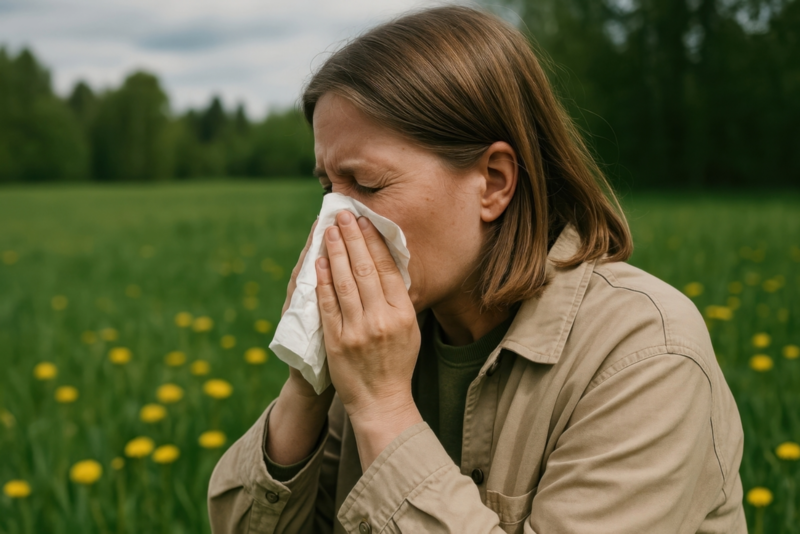News
Myth Busters: Allergy Edition

As a board certified allergist/immunologist practicing for nearly 13 years, I often hear the same questions and concerns from patients. Allergies affect so many of us, whether we’re sniffling and sneezing or worrying about a child's food reaction. But there's a lot of misinformation out there that can make managing allergies confusing and even scary. What are some of the biggest myths about allergies and testing? Based on the latest insights from trusted health organizations and recent studies, my goal is to help you feel more empowered and informed.
Myth: Allergies are just a minor inconvenience.
Reality: Oh, how I wish this were true! While some allergies cause mild sniffles, others can disrupt daily life and some can trigger severe asthma attacks or life-threatening reactions (called anaphylaxis). Allergies like hay fever affect up to 30% of people worldwide and can lead to poor sleep, missed work or school. Recent reports show that with rising pollution and changing climates, allergies are getting worse for many, leading to more provider visits. The good news? Early treatments such as avoidance measures to reduce allergen exposure, medications and allergy shots can make a big difference in keeping things under control.
Myth: Allergy tests are always 100% accurate.
Reality: Tests are helpful tools, but they're not perfect—they are more like a puzzle piece that needs other pieces to fit just right. Skin prick tests or blood tests can sometimes show a false positive (saying you're allergic when you're not) or miss something real, especially if medications or other factors interfere. Combining test results with symptoms and history offers your provider the most comprehensive picture. Remember, tests are just one piece of the puzzle; both testing and history are needed to diagnose allergies. Think of this equation: a positive test + a history suggestive of allergy = allergy.
Myth: You can outgrow any allergy.
Reality: Some food allergies are more likely to be outgrown—milk, egg, soy and wheat are likely to resolve by teen years. Others like peanut, tree nut fish/shellfish are less likely to be outgrown as we reach adulthood. With regard to environmental allergies, they can change over time, but may worsen or improve depending on where you are living and what you are allergic to.
Myth: All allergy symptoms are the same.
Reality: Allergies are as unique as you are! One person might sneeze from pollen, while another gets a rash from pets or tummy troubles from food. Allergies can present as food allergy, eczema, asthma, eosinophilic esophagitis or hayfever. Symptoms can overlap with colds or other issues, and things like exercise or stress can cause them to vary. If you're unsure, jotting down what you notice can help your provider figure out the real trigger.
Myth: Allergy shots (immunotherapy) work instantly.
Reality: These shots are game-changers for building long-term tolerance, but patience is key—they take months to start helping and years for full benefits. About 80-90% of people see real improvement, but it's a gradual process to retrain your immune system. Immunotherapy can teach your body to be “tolerant” to allergens rather than “allergic”- and sometimes that happens within 6 mos, sometimes it can take 1-2 years. But the total length of time to be on allergy shots is 3-5 years.
Myth: Food sensitivity or intolerance is the same as a food allergy.
Reality: Nope—these are different beasts and probably one of the biggest misunderstandings in my field! Allergies to food cause the immune system to make allergic antibodies to food, and as long as you are avoiding that food you should not have any symptoms. When exposed to a food you are allergic to, you can develop itching, flushing, swelling, hives, trouble breathing, nausea/vomiting or diarrhea and in severe cases anaphylaxis within minutes. Food allergies are diagnosed with blood testing or skin testing. It's important to note that extensive food allergy panels are NOT recommended due to the high rate of false positive testing, meaning you could test positive for a food in the blood but eat that food without experiencing any symptoms. This is NOT a food allergy! Remember the equation above: a positive test + a history suggestive of allergy = allergy.
Symptoms like bloating and constipation that are more chronic and occur even without eating are not consistent with allergies, so testing is not warranted for these symptoms. It's especially important to note that panels testing IgG to food is not scientifically proven and only tells you that you are tolerant to food. You can read more about this testing here. You could have other issues with food or digestion that are not indicative of an allergy, including irritable bowel syndrome (IBS) or lactose intolerance. Here is a helpful link if you want more information.
Myth: Allergy testing is painful and risky.
Reality: Most tests are quick and easy—a plastic scratch containing the allergen (i.e. peanuts, cats, dogs, etc.) on your skin that sits for 15 minutes. If you have a positive test, it looks and feels like a mosquito bite. Serious risks are rare (less than 1 in 10,000). We also sometimes check for allergies in blood tests via a simple blood draw, or we do food or drug oral challenges where you ingest the food or drug to assess for allergy. During these tests, the patient is watched very closely for reactions.
Myth: The severity of the allergies doesn’t matter in regards to treatment.
Reality: Everyone experiences environmental allergies differently; some are not bothered by mild- moderate symptoms and some only seek treatment for severe symptoms. Regardless of the severity, an allergist/immunologist can help. Whether it’s providing more information to help manage your allergies with medication or considering allergy shots, there are lots of ways to treat allergies. A misnomer about allergy shots is they only apply to patients with severe allergies. This is false. Regardless of the severity, allergy shots treat allergies in general by making your body tolerant to the offending allergen over time and are recommended for all severities.
When it comes to food allergy reactions, these can range from mild to severe and sometimes anaphylaxis can be life threatening. There are new ways to help reduce the severity (like biologics) if accidentally exposed when avoidance is hard. With many exciting advances in the field of food allergies, treatment options are expanding.
Myth: Chronic spontaneous hives are usually from an allergy.
Reality: If you've dealt with ongoing hives (also called chronic spontaneous urticaria or CSU) that seem to pop up without a clear trigger, it's easy to assume it's from an allergy like food or external trigger. But in most cases—greater than 90%—we don't find an external cause, and it's often your body's own immune system turning against itself, specifically through an autoimmune response that activates mast cells (the cells that release itch-causing chemicals). Recent 2024-2025 studies and guidelines show that about 30-50% of people with CSU have autoantibodies that target their own IgE receptors or IgE itself, leading to mast cell activation without any outside allergen. This calls for treatments that focus on calming the immune system, like antihistamines or biologics, rather than just avoiding triggers. If hives last more than six weeks, call an allergist/immunologist—it might not be what you think!
Unfortunately, many don’t understand allergies, and therefore the myths persist. A certified allergist/immunologist can not only dispel those myths, but help you or your loved ones uncover what’s causing discomfort and help you find relief.
More News
-
New!
More

The Heart of It All: How Cardiovascular Health Shapes Longevity
Most of us know a healthy heart will increase our chances for a long and vital life, but how many of us truly understand how to live for a healthy heart? According to the American Heart Association, heart disease remains the number one cause of death, for both men and women, in the United States.
-
New!
More

GLP-1s and Your Health Journey: What You Need to Know
Interest in GLP-1 agonist medications, once used almost exclusively for diabetes, is soaring. Now widely referred to as weight loss injections, drugs like semaglutide (Ozempic, Wegovy) and tirzepatide (Mounjaro, Zepbound) are ubiquitous in celebrity chatter, social media and everyday patient conversations. But as demand grows, it’s increasingly important to separate hype from reality. Who qualifies for these drugs under FDA guidelines? When are they helpful? And when might carefully supported lifestyle changes offer a safer or more sustainable path?
-
New!
More

Back on the Slopes: How to Recover Physically and Mentally After a Ski or Snowboard Injury
Living in a ski town, injury is inevitable. Recovery isn’t just about regaining strength, it’s about building trust in your body. The best path back to skiing blends physical training with mental conditioning, patience with persistence. With the expert teams at Vail Health - from Howard Head Sports Medicine to Vail Health Behavioral Health - recovery is more than healing; it’s coming back stronger, smarter and more confident than before.





